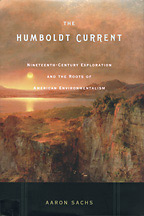Aaron Sachs follows 'The Humboldt Current' in new book
By Franklin Crawford

If the number of things named after a person is any measure of eternal fame, then Prussian naturalist and explorer Alexander von Humboldt should be a household name. There is the Humboldt Prize for Scientific Research -- but consider the Humboldt penguin, orchid, cranebill and willow, among numerous other flora and fauna, as well as such geographic features as Humboldt Bay, the Humboldt Mountain Range, the Humboldt River -- and, of course, the Humboldt Current.
The last is also is the title of an ambitious first book -- "The Humboldt Current: Nineteenth Century Exploration and the Roots of American Environmentalism" -- by Aaron Sachs, Cornell assistant professor of history. In the book, Sachs resurrects the spirit and the name of the world's first "ecologist" and his influence on American naturalists.
In terms of stature, Humboldt was the Einstein of his time. He developed the notion of what he called "unity in diversity" -- that there is a "web of mutual dependence" in nature.
"It's thanks to his [Humboldt's] effort to think globally that we understand the significance of global warming today," said Sachs, who will join in the 13th annual Homecoming book signing at the Cornell Store, Saturday, Oct. 14, from 11 a.m. to 1 p.m. "Humboldt trained himself always to look for the impact of a given phenomenon on other realms of the human and natural worlds."
In "The Humboldt Current," Sachs profiles four American explorers who were inspired by Humboldt's example -- and, in one chapter, discusses the origins of Herman Melville's "Moby Dick"; in another, John C. Symmes' quest to prove a "hollow Earth" theory.
Booklist writes: "Intertwining von Humboldt's philosophy on the interconnectedness of nature, Sachs introduces J.N. Reynolds, a colorful newspaper editor who campaigned for Antarctic exploration in the 1830s; Clarence King, first director of the U.S. Geological Survey, who was torn between scientific exactitude and aesthetic exhilaration in nature; and George Melville, a survivor of a disastrous Arctic expedition of the 1880s."
Sachs, a former environmental journalist, was a college student when he discovered Humboldt's legacy, not only on the map, he said, but also in "every bit of 19th-century culture that I looked at -- especially in the work of American writers like Emerson, Thoreau, Whitman, Melville -- and even Poe."
Why Humboldt now? "I was drawn to him both in a cultural history context and in the context of environmentalism," Sachs said. "I wanted to fill in a lacuna in our historical understanding, but I also thought his legacy could be extremely useful to us in addressing current problems."
The book is an absorbing, accessible narrative and a re-interpretation of a watershed time when far-flung exploits and increasing dependence on industry were just beginning to come home to roost in unpredictable ways.
Media Contact
Get Cornell news delivered right to your inbox.
Subscribe